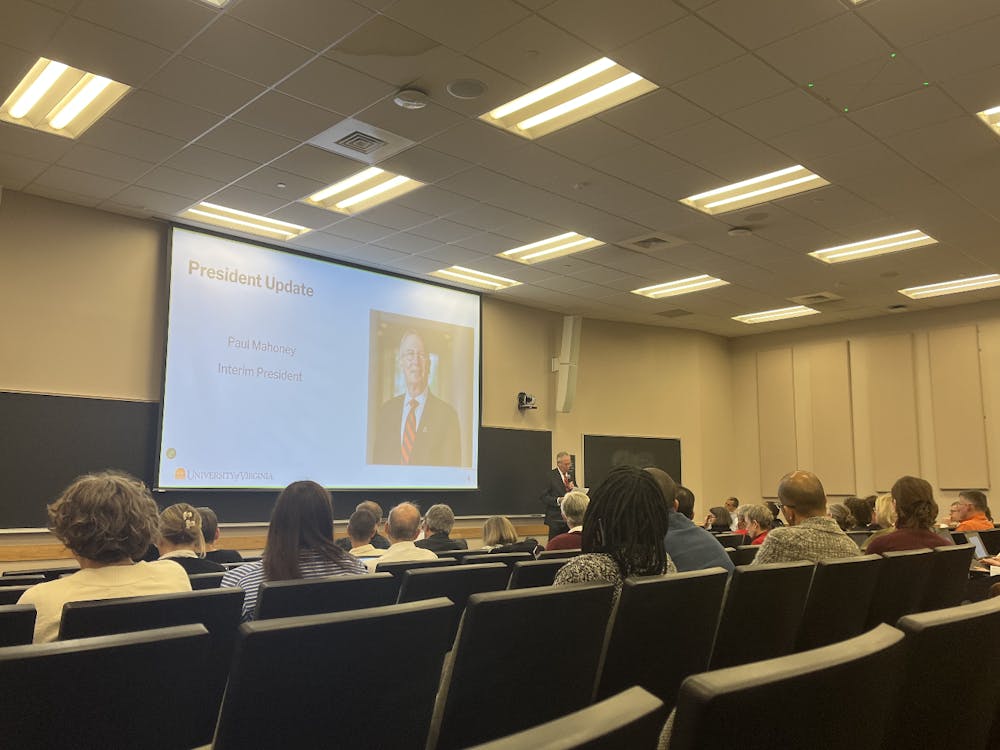A series of recent lawsuits and increasing amounts of administrative guidance have generated mixed opinions about the status of self-governance at two of the University's most symbolic institutions--the Honor and Judiciary committees.
Public and media scrutiny, legal pressure and outside investigation have characterized the student-run organizations in the past year.
Such legal intervention in the Honor and Judiciary Committees' workings, when coupled with other changes at the University, has threatened student self-governance, said Brock Jolly, Student Council vice president for administration.
"Over the past few years, student self-governance has definitely been challenged, if not compromised," Jolly said.
Yet despite the fact that both committees recently have faced unusual amounts of outside pressure, those closely involved with both committees say they do not think their authority is any weaker.
William Harmon, vice president for student affairs, said he did not believe student self-governance has declined in recent years.
"Nothing has been done to weaken the status of student self-governance," Harmon said. "Student self-governance remains as strong as ever."
Honor Committee Chairman Hunter Ferguson also said he does not believe student self-governance has been threatened by the recent legal entanglements faced by his Committee.
In the Honor Committee, "student self-governance is thriving," Ferguson said.
Increasing litigation
The just-finished UJC case concerning the assault on Alexander "Sandy" Kory has helped fuel concern about the status of student self-governance.
During the well-publicized UJC trial of University students Richard Smith, Bradley Kintz and Harrison Tigrett, who took part in the Nov. 21, 1997 assault, the presence of outside lawyers influenced the proceedings.
Before a UJC retrial of Smith, Kintz and Tigrett, three student prosecutors resigned claiming fear of being sued by the defendants. Smith previously had filed a slander lawsuit against Memphis, Tenn., resident Jan Rossini, alleging that she falsely told a Virginia Commonwealth Attorney that Smith had broken her son's neck during a high school wrestling match.
In addition, negotiations between lawyers for Smith and Kory threatened to overshadow the student trial process, as Kory's lawyer, Lloyd Snook, offered to drop all UJC charges for $500,000.
The influence of professional attorneys in the Kory v. Smith, Kintz and Tigrett case follows on the heels of two other situations in which the Honor Committee was sued outright.
Last April, former fourth-year College student Dina M. Padula filed a $200,000 lawsuit against the Board of Visitors, the Honor Committee, and Honor Advisor Kelly Mann. Padula, who had been found guilty of cheating during her Honor trial and expelled, claimed that the trial process deprived her of her right to due process. Padula dropped the suit soon after the Honor Committee granted her a retrial.
In November 1998, former student Jonathan Cobb, who was found guilty of cheating on an economics exam, sued the University as well as those involved in the case for $1.05 million.
Cobb's suit alleged that the Honor Committee failed to provide due process and breached "judiciary duty."
In an interview with The Cavalier Daily, President John T. Casteen III said he does not believe the self-governing nature of the committees makes their decisions vulnerable to lawsuits.
"The courts respect student government so long as it adopts coherent, fair procedures, sticks to them and deals in due process," Casteen said.
Ramifications of legal entanglements
Even more than in these lawsuits, controversy has followed the Kory v. Smith, Kintz and Tigrett case, as both students and faculty members have expressed concern about the legal snowballing of the case.
The UJC has been criticized for their lack of absolute control, UJC College Rep. Jonathan Carr said.
The criticism arises because "we have administrators that sort of have a veto over our decisions," Carr said.
Every trial verdict of the UJC is sent to Harmon for review.
Carr said because of confidentiality rules, he cannot confirm the existence of the Kory v. Smith, Kintz and Tigrett case, but that if such a case were to occur, this type of outside administrative and legal involvement would affect the UJC's reputation.
"It could give the impression that the judicial committee could be influenced by outside sources," he said.
He added that the Committee has become aware of the role that the increasingly litigious nature of society could play in UJC trials.
"We're going to have to come to terms with lawyers and make sure that our cases are dealt with in an appropriate manner," Carr said.
Additional outside involvement
Outside involvement in the University's student courts has not been limited to attorneys and the administration, but has also involved the federal government.
The Office of Civil Rights, an arm of the federal government devoted to eliminating racial bias in public institutions, recently completed an investigation of the Honor Committee in response to an anonymous complaint logged with the office last summer. The inquiry marked one of the only times the federal government has investigated the Committee, Ferguson said.
Additionally, both the Honor and Judiciary committees are considering strengthening their own access to outside legal resources by hiring a new legal advisor.
Board of Visitors Rector John P. Ackerly III said he believes hiring a legal advisor for the Committee will make the students more likely to ask for the legal assistance they need, and could also provide the necessary help if a lawsuit arose again.
"We want the Honor Committee and the Judiciary Committee to have the authority they need to carry out their responsibilities," Ackerly said.






